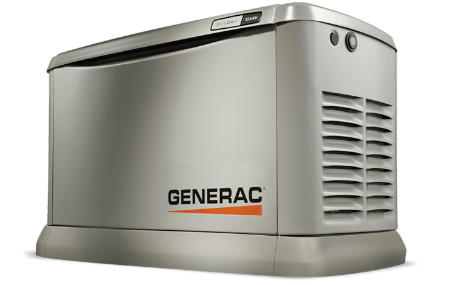A home standby generator is a great addition that will protect your home against power outages. Home standby generators are different from portable generators as they are hardwired into the house’s electrical system via something known as a transfer switch. They also have a permanent fuel source and are connected either to the home’s natural gas supply or to a large propane tank. These factors allow the generator to fully power a home during a blackout, and this guide will explain all you need to know about home generators and how they work to provide electricity to a home during a power outage.
The Process For Installing a Home Standby Generator
A standby generator is always mounted on a concrete pad somewhere outside the home to ensure it is stable and level. The next step is for an electrician to install a manual or automatic transfer switch at the main electrical panel. A heavy-duty, waterproof electrical cable is then run between the generator and the transfer switch and wired to both. The last step is to run a gas line to the generator and connect it either to the home’s main natural gas line or to the propane tank.
Understanding How a Transfer Switch Works and Why It’s Necessary
The transfer switch is what allows a standby generator to supply electricity to a home during a power outage, and all standby generators must be connected to the electrical system via a transfer switch. It is both illegal and extremely dangerous to wire the generator directly into the electrical panel. If a standby generator was directly wired into the electrical panel, it could easily overload the whole electrical system and cause serious damage to your appliances and your home’s wiring.
Without a transfer switch, some of the power produced by the generator would also flow back out into the electrical grid. This would be a major safety hazard as it could electrocute anyone working nearby trying to get the grid back online, which is why it’s illegal to connect a generator without running it through a transfer switch. A transfer switch prevents this issue by temporarily isolating the home and disconnecting it from the grid so that all the electricity from the generator flows only into the home and can’t leak out into the grid.
An automatic transfer switch is much more convenient than a manual transfer switch. With a manual transfer switch, you’ll need to turn on the generator manually when the power goes out and then flip the switch so that the power from the generator starts flowing into your electrical system.
How a Home Generator Works When the Power Goes Out
The automatic transfer switch is what controls a home generator and ensures it will always run any time your power goes out. The switch is installed just before the main electrical panel where the electricity flows into the home, and it works by continuously monitoring the power coming into the panel. This allows it to instantly know when the power is out and also know when the power comes back on.
When the switch detects an outage, it activates and isolates the panel from the grid. At the same time, it signals the generator to run and start sending electricity to the home. The transfer switch will then continue to monitor and check if power is flowing through the grid to the home. Once it detects that the outage is over and power is again flowing through the grid, it will then signal the generator to shut down and reconnect the home to the grid.
The process from when the transfer switch detects the power outage until the generator starts supplying electricity to the home typically takes less than a minute. The generator will start running almost immediately when it receives the signal from the transfer switch to turn on, but it usually takes up to 30 seconds for the generator to warm up and start producing electricity and sending it to the home. Still, the fact that the process happens automatically means your power will quickly be restored without you having to lift a finger.
Most standby generators are rated to run continuously for up to 500 hours. This means it can continue powering all your appliances, your heating or air conditioning system and everything else in your home, even if the power in your area was out for three weeks. With a standby generator, you’ll be able to keep your food cold, your lights on and your home comfortable even if a major storm knocks the power out for a prolonged period.
How To Choose the Right Home Standby Generator
The most important thing when choosing a home standby generator is to make sure that the unit is adequately sized and produces enough electricity to power all the things you think you may need during a blackout. You’ll also need to decide whether you want your generator to run on natural gas or propane. Natural gas is typically the better option, unless you live in a rural area where your home doesn’t have natural gas, as it will be cheaper, and you won’t have to worry about the propane tank running low if your generator has to stay on for a long time.
Choosing the correctly sized generator can be complicated, and you should always have an electrician calculate your home’s energy needs. Most standby generators feature an electronic controller that enables you to prioritize certain appliances or circuits, and you can also simply program it so that some circuits are shut off and don’t receive any power. This means you don’t need the generator to be large enough to power everything in your home at the same time. Nonetheless, it is important that the generator isn’t too small or else it may easily become overloaded, which will cause it to automatically shut off.
In homes with central air conditioning, the size and energy efficiency of the AC unit will be the starting point when determining how powerful the generator needs to be. This is because an AC unit typically draws far more power than anything else in a home, and the electricity required for an air conditioning system to start is typically two to three times greater than the power draw when the system is up and running. If the generator isn’t powerful enough, your AC will either overload it or force the controller to take away power from almost everything else in the home whenever your AC needs to turn on.
Let the Professionals Handle Everything
Childers Air Plumbing & Electric is the top choice if you’re looking for standby generators in the Beckley area, and we install both whole-home residential generators and commercial standby generators. When you choose us, you can rest assured that we’ll take the time to help you decide which generator is best and then professionally handle the installation and testing process from start to finish.
With more than 60 years of experience, we’re ready to take care of all of your home’s electrical, heating, air conditioning and plumbing needs. Contact us today if you have any questions about our generator & generac generators services or to schedule a consultation to find out which generator is the best choice for your home or business.

